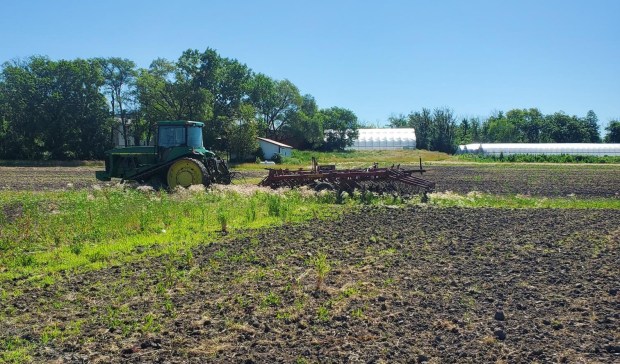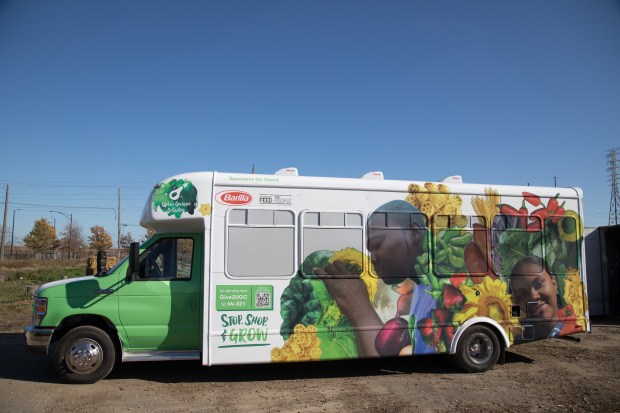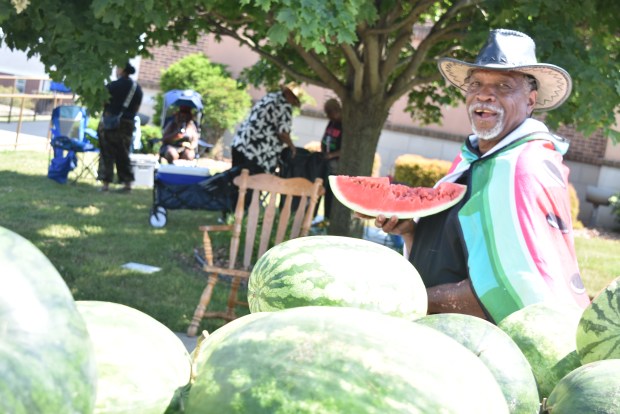The Conservation Fund is working to revive and sustain Chicago metropolitan area farms through its Farms Fund program. This is the last in a series spotlighting its work with farmers in the south suburbs.
Helping build economic opportunity for Black and brown urban food growers, mitigating food insecurity and increasing access to high quality, affordable, culturally affirming and nutritious food has been the focus of Urban Growers Collective, a Black, woman-owned nonprofit.
The Chicago-based organization, which has eight small farming sites in the Chicago area, has expanded into the south suburbs, tripling the land it has for cultivation thanks to support from The Conservation Fund Farms Fund program.
The farms fund, a lease-to-own program of the Virginia-based nonprofit environmental group, acquires land for farmers who lease the property and then purchase the land at agriculture value in three to five years.
Earlier this year, the fund purchased 30 acres in unincorporated Cook County near Lynwood on behalf of Urban Growers Collective. Urban Growers Collective is leasing the farm which it will ultimately own and that includes a roadside farm stand along with 13,000 square feet of greenhouses and a home.
The farms fund was created to address the loss of farmland to development, especially adjacent to urban areas, which is undermining food system security, said Kelly Larsen, Chicago Metro Farms Fund manager.
The fund seeks to assist the next generation of farmers who can’t afford high land prices and who are committed to sustainable practices. The goals are to help keep communities supplied with healthy, locally produced food and to tackle inequities in farmland ownership.
Urban Growers Collective, founded in 2017, produces vegetables, culinary and medicinal herbs and flowers, said Erika Allen, CEO and co-founder. It also provides training and education on urban agriculture and food systems for youth and up-and-coming growers as well as employment opportunities.
Each of its farms uses organic growing methods, intensive growing practices, and year-round production strategies to best maximize growing space, according to its website.
“This is our first large-scale farm operation,” said Allen of the south suburb site. “It is really exciting for us to be able to continue the legacy of the land use and be of service to the community in growing food and contributing to the wholesale market with local production at a larger scale than we’ve been able to do.”
In Chicago, its produce is available to the public at farmers markets and through the Collective Supported Agriculture program. That program is a subscription that allows members to receive weekly shares of fresh, local produce grown by Urban Growers Collective.
It also sells produce through its Fresh Moves Mobile Market, a “produce aisle on wheels” in Chicago. To help close the food access gap and bring produce to minority communities that have been historically divested, Urban Growers Collective converted a bus into the mobile farmers market. Customers can board the bus and shop for fruit, vegetables and grocery staples priced to be affordable and provide a fair return for the farmers and makers, notes its website.
At its south suburb location, Urban Growers Collective welcomes the opportunity to sell produce to the community directly through the farm stand. It also hopes to work with partners in the area to provide delivery services that serve food insecure individuals who may have mobility and transportation issues, Allen said.
Besides producing vegetables, the south suburb site will provide nursery plants.
“We will be encouraging folks to have the materials they need to grow their own food,” said Allen.
“The site also allows us to also expand some of our youth education programming to be able to employ and reintroduce young people to agriculture,” she said. “We look forward to working with 4-H and entities like the farm bureau with some of the programs they offer now that we have a larger space where we can do some of those trainings.”

The Conservation Fund Farms Fund program is fulfilling a need, Allen said.
“It works to the benefit of organizations like mine,” she said. “They help us get the conservation easement, get the property approved, with issues around repair and other things that allows us to not take on all the capital and improvement burden on our own.
“It’s within their mission to make sure these lands aren’t converted to fulfillment centers or warehouses or other things, that we maintain these lands in perpetuity for food and farm and environmental production,” she said.
The farms fund program targets those who have been farming in a leadership role for a minimum of three years, have at least two years of financial records and are committed to growing food for people using sustainable practices. Participants in the program must meet certain benchmarks.
Since the program launched in Chicago in 2022, it has secured five farms, totaling more than 220 acres, which are serving more than two dozen farmers, said Larsen. More than 70% are owned by Black, Indigenous and other people of color and women, she said.
Allen, who grew up on a 120-acre farm outside of Milwaukee and lives on the South Side of Chicago, finds joy in farming.
“Reactivating farming and growing in our society and seeing how therapeutic and healing it is for people to share their stories, their agriculture heritages, there’s something about that that I love,” she said.
“There is also gratification in taking a seed, going from seed to harvest to the table, seeing that reactivated in our society is really fulfilling,” she said.
Allen said the pandemic helped highlight the importance of being able to grow food and put the spotlight on food insecurity.
“It’s not just one portion of society that has food insecurity issues,” she said. “Any of us can be food insecure at any time. Being able to have the material, the soil, the fertility, the seed, the know how to grow food is something we all need to be able to do. It’s exciting to see that expanding and that there are passionate people wanting to go back into farming. It’s critically important.”
Francine Knowles is a freelance columnist for the Daily Southtown.




